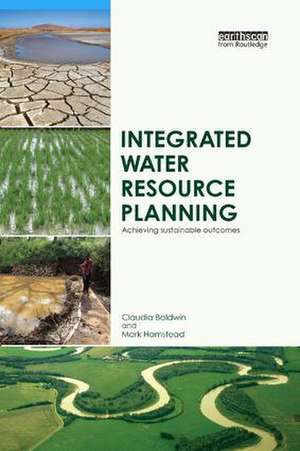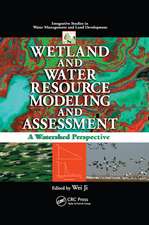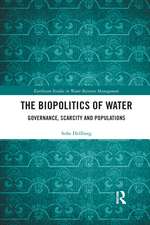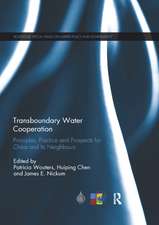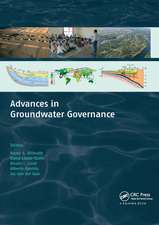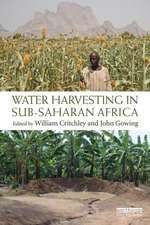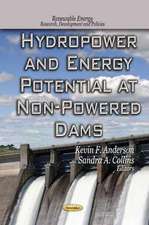Integrated Water Resource Planning: Achieving Sustainable Outcomes
Autor Claudia Baldwin, Mark Hamsteaden Limba Engleză Paperback – 21 noi 2018
The book will fill in the gaps for professionals in interdisciplinary teams including sociologists, hydrologists, engineers, ecologists, and community consultation specialists, by providing a basic grounding in areas outside their usual expertise, and will provide ammunition to community stakeholders in their quest to ensure that water planning outcomes are justified and justifiable.
Case studies provide an understanding of the context, practical tools and implementation techniques for achieving sustainable outcomes, and the multi-disciplinary approach and insights offered in this book will be transposable and instructive for water professionals worldwide.
| Toate formatele și edițiile | Preț | Express |
|---|---|---|
| Paperback (1) | 314.07 lei 6-8 săpt. | |
| Taylor & Francis – 21 noi 2018 | 314.07 lei 6-8 săpt. | |
| Hardback (1) | 689.66 lei 6-8 săpt. | |
| Taylor & Francis – 26 aug 2014 | 689.66 lei 6-8 săpt. |
Preț: 314.07 lei
Nou
Puncte Express: 471
Preț estimativ în valută:
60.11€ • 62.44$ • 49.93£
60.11€ • 62.44$ • 49.93£
Carte tipărită la comandă
Livrare economică 01-15 februarie 25
Preluare comenzi: 021 569.72.76
Specificații
ISBN-13: 9781138372597
ISBN-10: 1138372595
Pagini: 276
Ilustrații: 52
Dimensiuni: 156 x 234 x 22 mm
Greutate: 0.39 kg
Ediția:1
Editura: Taylor & Francis
Colecția Routledge
Locul publicării:Oxford, United Kingdom
ISBN-10: 1138372595
Pagini: 276
Ilustrații: 52
Dimensiuni: 156 x 234 x 22 mm
Greutate: 0.39 kg
Ediția:1
Editura: Taylor & Francis
Colecția Routledge
Locul publicării:Oxford, United Kingdom
Public țintă
Academic and Professional Practice & DevelopmentCuprins
1. Introduction 2. Guiding Principles 3. The Planning Framework 4. Consultation and Collaboration 5. Situational Analysis 6. Objectives and Logic 7. Management Options 8. Comparative Assessment 9. Monitoring and Evaluation 10. Conclusion References Appendix
Notă biografică
Claudia Baldwin lectures in regional and urban planning at the University of Sunshine Coast, researching in social, institutional issues, governance and collaborative processes in water, coastal and land-use planning and management. Where possible, she uses interactive and visual research techniques. She has more than 30 years experience in policy, planning and management positions in Queensland government, Great Barrier Reef Marine Park Authority, and as a consultant overseas and in Australia.
Mark Hamstead is a respected water resource policy and management specialist with 29 years experience. He provides advice and analysis to government agencies and the private sector. His areas of expertise include water policy and legislation, water planning and management, water entitlements, water trading, water accounting, water resource assessment and water usage metering and monitoring. In recent years Mark has prepared, or been a major contributor to, a range of reports for Australian water authorities including such things as water planning, water trading and managing water for environmental outcomes. Prior to becoming a consultant in 2005 Mark worked for many years in government water agencies in Australia.
Mark Hamstead is a respected water resource policy and management specialist with 29 years experience. He provides advice and analysis to government agencies and the private sector. His areas of expertise include water policy and legislation, water planning and management, water entitlements, water trading, water accounting, water resource assessment and water usage metering and monitoring. In recent years Mark has prepared, or been a major contributor to, a range of reports for Australian water authorities including such things as water planning, water trading and managing water for environmental outcomes. Prior to becoming a consultant in 2005 Mark worked for many years in government water agencies in Australia.
Recenzii
"Integrated Water Resources Management (IWRM) has, for many years been rolled out as the panacea for the many challenges of water scarcity and security faced by individuals and by communities globally. Instead of adding another tome to the IWRM pile, the authors tackle the issue of planning, building on their wealth of real experience of conflict and hard decision-making, much from Australia, but with contributions globally. And this focus on planning, on actions and outputs, and on knowing the outcomes desired is the key take home message and value of the book. Developed step-by-step, working through the planning cycle with communities and supported by examples, this provides real insight, instruction and guidance to effective delivery of IWRP."
Professor Chris J Spray MBE, Chair of Water Science and Policy, UNESCO Centre for Water Law, Policy & Science, University of Dundee.
"This book provides practical guidance for the implementation of integrated water resource planning. The authors draw on their outstanding policy and planning experience and embed Australian and international case studies throughout the text to integrate and synthesise approaches to water planning in Australia and overseas. This book is a timely aid to achieving the three goals of economic efficiency, social equity and environmental sustainability in water planning. The holistic view and clear expression will appeal to a wide audience, especially water planning practitioners, but also teachers, students, researchers, community members, and water users in general."
Professor Kathleen Bowmer, Charles Sturt University and Research Fellow, CSIRO Land and Water
"Water is central to economic development, environmental sustainability and individual livelihoods. Yet, as the authors of this book point out, access to water is becoming increasingly constrained in many parts of the world because of population growth, increasing living standards and, in many places, the effects of climate change. Systematically planning for people's rights to access water will become increasingly important as water becomes scarcer.
Australia has been at the forefront of international water management for the last decade. This book draws upon the authors' experience in Australian water planning to provide a highly practical guide to water planning. The authors have broken the planning process up into six steps, from inception to monitoring and review, with the overall process embedded in best international practice. They provide a wide variety of options and techniques that can be employed at each step, with practical examples from Australia, Africa, Europe and North America.
I would recommend this book to all water managers who have to deal with the allocation of water in the face of scarcity. It provides a solid framework grounded in practical experience. It will also be a valuable guide to teachers and lecturers needing to illustrate both the theory of planning and practical issues and methods to students."
Richard Davis
Professor Chris J Spray MBE, Chair of Water Science and Policy, UNESCO Centre for Water Law, Policy & Science, University of Dundee.
"This book provides practical guidance for the implementation of integrated water resource planning. The authors draw on their outstanding policy and planning experience and embed Australian and international case studies throughout the text to integrate and synthesise approaches to water planning in Australia and overseas. This book is a timely aid to achieving the three goals of economic efficiency, social equity and environmental sustainability in water planning. The holistic view and clear expression will appeal to a wide audience, especially water planning practitioners, but also teachers, students, researchers, community members, and water users in general."
Professor Kathleen Bowmer, Charles Sturt University and Research Fellow, CSIRO Land and Water
"Water is central to economic development, environmental sustainability and individual livelihoods. Yet, as the authors of this book point out, access to water is becoming increasingly constrained in many parts of the world because of population growth, increasing living standards and, in many places, the effects of climate change. Systematically planning for people's rights to access water will become increasingly important as water becomes scarcer.
Australia has been at the forefront of international water management for the last decade. This book draws upon the authors' experience in Australian water planning to provide a highly practical guide to water planning. The authors have broken the planning process up into six steps, from inception to monitoring and review, with the overall process embedded in best international practice. They provide a wide variety of options and techniques that can be employed at each step, with practical examples from Australia, Africa, Europe and North America.
I would recommend this book to all water managers who have to deal with the allocation of water in the face of scarcity. It provides a solid framework grounded in practical experience. It will also be a valuable guide to teachers and lecturers needing to illustrate both the theory of planning and practical issues and methods to students."
Richard Davis
Descriere
This book provides practical guidance on water allocation planning through each step of the process. It critically evaluates, compares and contrasts water reform around the world to improve understanding of context, process and outcomes. Best practice and a variety of practical tools and implementation techniques for achieving sustainability objectives are illustrated through international case studies. Theoretical foundations of integrated and adaptive water management provide a basis for solving a range of interrelated water dilemmas.
